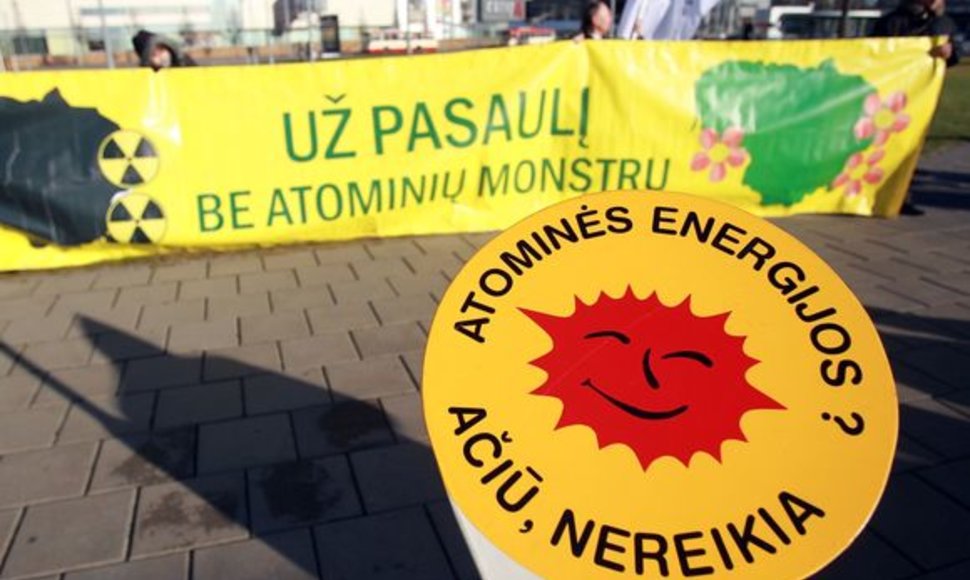Speaking to 15min, he lists one argument after another against the project: a decline in population and energy consumption; massive debt; lack of experienced nuclear energy professionals, the threat that Lithuanian habits will supersede Japanese efficiency and work culture.
- Let's get down to business – do we need Visaginas Nuclear Power Plant or not?
 |
| BFL nuotr./Gintas Umbrasas |
- Frankly, no. For several reasons. One of them is my moral attitude. Just like all engineering projects, a NPP involves certain risks. Bearing in mind the risk and the fact that Lithuania is a small, though sparsely-populated, country, if, God forbid, we had something similar to Chernobyl or Fukushima happen in Visaginas, Lithuania as a country would in all likelihood be erased from the map.
Second, the project involves massive investment, while we will not have an energy demand that we can predict. Our population is ageing and getting smaller. Lithuania is not a country that could suddenly develop an energy-intensive industry like chemistry or metallurgy. We have neither raw materials to process nor human resources. We do not even permit to build a modern pig farm. If someone wanted to build a huge factory, people would probably raise barricades.
- But specialists estimate that, by 2030, energy consumption will have risen to 18 TWh a year – and the Lithuanian share of Visaginas NPP capacity will only cover one third of this.
- We can look at a chart by the World Bank, showing the change of electricity consumption by industry and households over the last ten years. Add to that the projected demographic curve – the figures will be even smaller than expected in these estimates.
As I see it, nuclear energy is immoral and dangerous. We haven't solved the question of how to dispose of spent fuel. We could seek comfort by saying that science develops very fast and, in 20 to 30 years, it might present solutions to what to do with nuclear waste. Today, however, we do not have the solution.
If the project makes little economic sense, we will put a massive debt on the smaller generation of our children for twenty years if not longer.
- Advocates of the project speak of huge revenues to the state budget. Critics doubt if it will pay off financially. What do you think?
- I have drawn hundreds of projects and business plans. And in each case, there is a clash of three positions: the professional one; the “I want it very much” one; and the pessimist one.
I think that people who put together plans for Visaginas NPP were professionals, but burdened with political pressure of the “we need it real bad” variety. A business plan is always based on assumptions – and one chooses those that are the most optimistic. If a sceptic picked pessimistic assumptions, figures in the NPP business plan would be different.
In general, a plan is a talk about the future. Judging by our past experience with nuclear constructions, final tally would exceed original estimates by 50 percent or more – in the end, construction would be more expensive, last longer, require additional safety measures.
- The Visaginas NPP plan includes a pessimist scenario, too: additional 1.7 billion litas in interest, several years of prolonged construction. Olkiluoto Nuclear Power Plant in Finland was supposed to be built by 2009, but due to technical and bureaucratic reasons the opening was pushed back to 2013, while the price grew two-fold. How likely are we to avoid similar mistakes?
- Show me a single Lithuanian project that was finished in time. In this case, the only argument is that Hitachi does business differently. But it will have to work with the Lithuanian Government and put up with its inability to negotiate, understand, and agree. It might suddenly emerge that we failed to build roads on time, carry out our side of the project – we are still burdened with post-Soviet culture of work execution. I would be surprised if the Japanese managed to withstand our talent to mess things up.
Another argument is our lack of experience in managing large-scale projects. We do not have a new-generation Algirdas Brazauskas who would venture to build a Kaunas Water Power Plant at 25 or 30, a Bronislavas Lubys to inspire us to follow through until the end. Politicians' wishes alone are not enough to carry out projects like that. And with so much uncertainty, one should probably not put that much of one's own money into it.
- But bearing in mind the Japanese work culture, perhaps we should not be so pessimistic?
- I am not pessimistic, I am realistic. I do not believe one can bring a piece of Japan on one's palm and implant the Japanese work culture in one or two districts. There will probably be a cultural mix and many clashes. Lithuanians themselves are not doing any preparation for the future construction – or else they know how to do everything already. I've heard some entrepreneurs say that there is a difference between European and Japanese understanding of quality. There is another difference between European and Lithuanian standards. I do not believe we could smoothly take over the Japanese culture or that the Japanese themselves truly realize how things are done here, thousands of kilometres away from them.
- The government tries to lure voters by promising 6 thousand new jobs. Some of them will doubtlessly go to the Japanese, but is our business ready to claim the rest?
- In Finland's nuclear power plant, out of 5 thousand jobs only one thousand went to local workers. And we are talking about Finns who are probably more fluent in English than Lithuanians, have more of the big industry. We can hardly expect to get a bigger share of those 6 thousand jobs.
Another problem is that as we were closing down Ignalina NPP, we failed to realize that there are legal and qualitative rules of the game. The job is done, yet something is wrong and therefore we won't get the money – and we don't even know why. Our ignorance is doomed to be even more appalling in building a new facility.
I believe some engineers when they say that, by joining forces, they can land a contract or two, that our service industry will adapt well; but we won't get a big share of this giant investment. Most of it will go to multinational corporations.
- Lithuania is advised to use its full potential – we have had experience in nuclear energy, people who worked in Ignalina NPP. Will we have enough specialists?
- Since our EU accession talks in 2002-2004, nuclear energy specialists knew well that Ignalina Plant would have to be closed down. What did it mean for a young specialist with internationally highly marketable skills? Is Visaginas the most attractive place where he or she could live and grow?
As far as I know, some of them moved to Russia, some went elsewhere. Specialists who remained where those who had come along with Viktor Shevaldin and now decided to stay and wait for their retirement. How do specialists of this kind behave? They usually take up defensive positions and “kill” anyone who threaten to replace them.
Intellectual potential of Visaginas has not grown since EU accession. The construction will last ten years, so there is enough time to train a new generation of specialists – but that will be expensive, too. With the population hardly superfluous, it remains to be seen if these specialists will be Lithuanians willing to live there and work in nuclear energy. I would not be surprised if they were Japanese or perhaps Chinese graduates of US or French universities.
- Belarusians and Russians are building their own nuclear facilities. Perhaps it would be cheaper for us to buy electricity from them?
- Everyone keeps saying: if we are dependent on our neighbours for energy, all kinds of misery will befall us. I don't think that buying energy is such a bad thing.
When we buy electricity, we give away money in small chunks – just like renting an apartment. By building a nuclear power plant, the present generation will be giving a lot of public money. It might turn into one more reason for people to say: I'd rather stay in England or Norway and happily build my virtual Lithuania – with wind power plants, water energy, Norwegian gas, strawberries, and all the rest.













